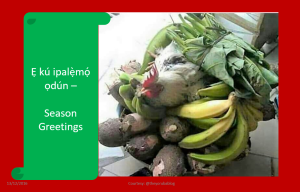Ẹ kú ipalẹ̀mọ́ ọdún o. Bi ọdún bá sún mọ́ etílé, oúnjẹ àti ohun èlò gbogbo maa nwọn nitori àwọn ọlọ́jà yio ti fi owó kún ọjà nitori èrò ti ó fẹ́ ra ọjà maa n pọ̀ si ni àsikò yi. Pa pọ̀ mọ́ ipari ọdún ni àwọn ti ó fi ayẹyẹ iyàwó, òkú, ọdún Kérésìmesì àti ṣíṣe miràn si àsikò yi.
Kò si ẹni ti kò ni nkankan. Pé èniyàn ni ara li le tàbi ó lè jẹun, ó tó nkan. Ilẹ̀ Yorùbá ni ohun ọrọ̀ ajé àti oúnjẹ ni oriṣiriṣi tẹ́lẹ̀, ṣùgbọ́n lati igbà ti Ìjọba àpapọ̀ ti da gbogbo ẹ̀yà orilẹ̀ èdè Nigeria pọ̀ ti wọn si bẹ̀rẹ̀ si pin owó epo rọ̀bì ni ìfẹ́ oúnjẹ àti ọjà òkèèrè/òkè-òkun ti sọ ọ̀pọ̀lọpọ̀ di ọ̀lẹ àti ẹni ti kò ni ìrònú.

Oúnjẹ ilẹ̀ wa – Home grown food. Courtesy: @theyorubablog
Àsikò tó lati ṣe àyípadà, ki a jẹ ohun ti a ba gbin ni ilẹ̀ wa, nitori owó epo rọ̀bì ti gbogbo ilú gbójúlé ti fidi janlẹ̀. Ki owó epo rọ̀bì tó dé, a nfi ìrẹsì ṣe ọdún pàtàki fún àwọn ọmọdé, ṣùgbọ́n iresi ti wọn gbin ni ilẹ̀ wa ni a njẹ. Bi a ra oúnjẹ ilẹ̀ wa dipò oúnjẹ òkè-òkun, àgbẹ̀ yi o ri owó, a o si mọ irú oúnjẹ ti a njẹ ju ìrẹsì oníke ti wọn nkó wọ ilú.
Ki ṣe dandan ni ki a se ìrẹsì fún ọdún, a lè fi oúnjẹ ẹ̀yà miràn ṣe ọdún fún àwọn ọmọ. Fún àpẹrẹ, Ìjẹ̀bú lè se ọbẹ̀ ẹ̀fọ́ rirò àti iyán dipò ìkọ́kọrẹ́ fún ọdún tàbi ki Èkìtì se ìkọ́kọrẹ́ fún ọdún dipò iyán àti ẹ̀fọ́ rirò àti bẹ́ ẹ̀ bẹ́ ẹ̀ lọ. Ẹ jẹ́ ki a gbé oúnjẹ ilẹ̀ wa lárugẹ.
ENGLISH TRANSLATION
Season greetings. When the festive period is close by, marketers often raise the price of foodstuff and other goods in response to higher demand. In addition to the end of year celebration, people often celebrate marriages, burial, Christmas and other events at this period.
There is no one who can claim to have nothing. The fact that one has life and can eat, is something. In the past, Yoruba had a thriving commerce and various types of foodstuff, but since the Federal Government introduced the unitary system of government in place of regionalism, and began to share crude oil revenue, the love of foreign food and goods increased, people became lazier and could not think of ways of improving our own products.
It is now time for ‘change’ to begin consuming our home grown food, because the revenue from crude oil that the entire country is depending on has crashed. Before crude oil became the mainstay of the economy, rice was a meal prepared during festive season for the children, but it was home grown rice not imported. If we patronise our local food, then we would be sure of the kind of food being consumed, it will boost the income of local farmers and prevent importation of plastic rice.
It is not compulsory to cook rice during celebration, food from other ethnic groups can be prepared for the children to explore during the festive season. For example, Ijebu people can prepare vegetable and pounded yam instead of water yam pottage (ikokore), while Ekiti can cook water yam pottage (ikokore) instead of pounded yam and vegetable soup etc. Let us join hands to promote our foods.
Originally posted 2016-12-13 18:51:54. Republished by Blog Post Promoter


